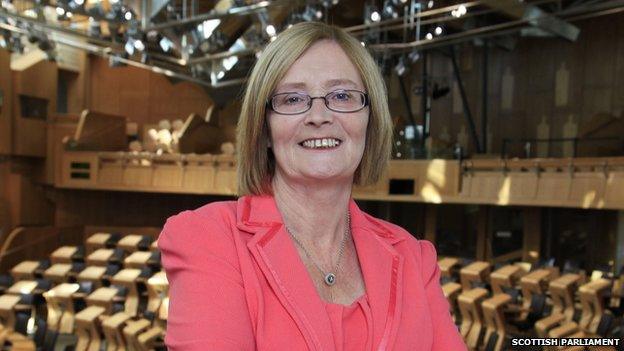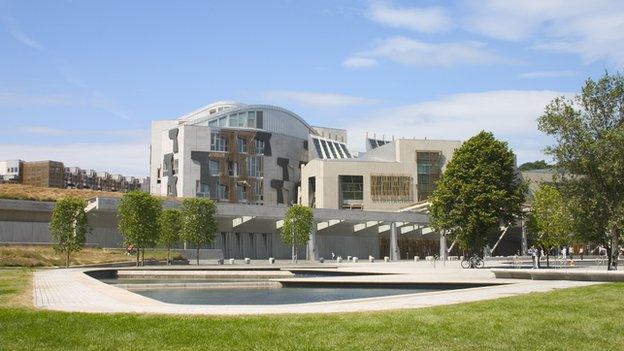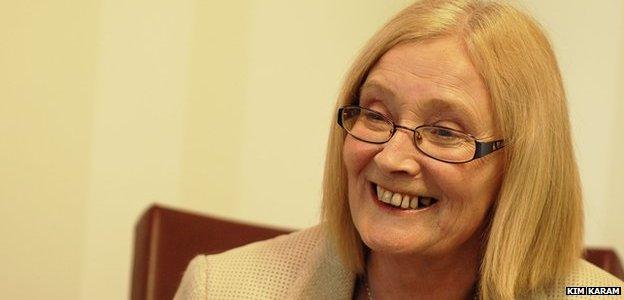Scottish independence: Tricia Marwick says country will come together after vote
- Published

Presiding Officer Tricia Marwick said Scotland was an inspiration to countries throughout the world
Scotland will "come together" after the referendum regardless of the result, according to the presiding officer of the Scottish Parliament.
Tricia Marwick said she was "absolutely confident" that politicians would work together "to get the best result for the people of Scotland".
And she said Scotland was an "inspiration" to other countries.
The formal 16-week campaign period ahead of the referendum on Scottish independence has now begun.
The start of the election period sees a strict limit applied to how much money registered campaigners can spend, in order to ensure a level playing field for both sides in the debate.
It also obliges broadcasters to stick to rules on impartiality, with both the BBC, external and regulator Ofcom, external setting out guidelines on how to achieve this.
The exact rules governing the period are set out in the Scottish government's Referendum Act, external, with the Electoral Commission responsible for ensuring they are obeyed.
Voters will go to the polls on 18 September. They will be asked the Yes/No question: "Should Scotland be an independent country?"
Speaking publicly for the first time about the referendum, Mrs Marwick told BBC Scotland that the eyes of the world were on the country, and that Scotland's "constitutional journey" was an inspiration to others.
Mrs Marwick said she was determined that the parliament as an institution would be neutral in the debate, and would work to help politicians whatever the result.
Asked whether she thought there would need to be a process of healing following the outcome of the referendum, the presiding officer referred to the aftermath of Scotland's previous referendums, in 1997 and 1979, as evidence that there would be a "coming together".

The presiding officer is responsible for chairing sessions of the Scottish Parliament
"In 1979 when Scotland voted for an assembly and it was denied, people came together," said Mrs Marwick, who was elected as presiding officer following the 2011 Holyrood election.
"In 1997 there were Conservatives who were passionately opposed to the creation of a Scottish Parliament. The coming together that we saw after both of these referendums, we will see again. I am absolutely confident of that."
Mrs Marwick was elected as the SNP MSP for Central Fife at the 2011 Holyrood election before being appointed to the politically neutral role of presiding officer - the Scottish Parliament's equivalent of the Speaker in the House of Commons.
She said it was an "enormous privilege" to represent the parliament during such a key time, and she believed politicians on both sides would accept the result, whatever it was.
"Politics is about passion and differences," she said.
"There's nothing inherently wrong with people having different views provided they acknowledge that once the people have spoken, they have spoken.
"Scotland's constitutional journey has been an entirely democratic process, and I am absolutely confident, knowing the politicians in this parliament, that regardless of the outcome they will accept it."
She added: "Scotland is an inspiration to countries throughout the world because our constitutional journey has been conducted entirely through the democratic process and will continue to be so.
"It's a unique journey and we need to recognise and celebrate that."

In conversation with...

As part of a series of interviews with high-profile women during a crucial year for Scotland, Holyrood's Presiding Officer Tricia Marwick speaks to the BBC's Marianne Taylor about keeping MSPs in check, how she's faced cancer and being a procedural geek.

In a wide-ranging interview, Mrs Marwick also discussed the changes she had made to procedures at the Scottish Parliament, her approach to the role of presiding officer, the recent deaths of four sitting MSPs and her own ill health - she had an operation to remove a tumour from her bowel last year.
'Gearing up'
Asked whether Holyrood was ready to take on extra powers after the referendum, Mrs Marwick said the parliament was already "gearing up" for the greater tax powers being devolved from Westminster in 2016.
She added: "If there's a 'Yes' we'd expect everyone to work together to get the best result for Scotland, if there's a 'No' people here have got to get the best result for the people of Scotland.
"As a parliament, we will assist everybody to do that."
A spokesman for pro-independence Yes Scotland said: "It is to Scotland's credit that the independence debate is being conducted peacefully and for the most part in a responsible and respectful manner.
"Of course, there have been occasions when enthusiasm and passion have, regrettably, been overtaken by rancour or offensive behaviour.
"However, we have no doubt that whatever the outcome on September 18, people in Scotland - including politicians - will seek to do what is in Scotland's best interests."
A spokesman for Better Together, which supports the Union, said: "It's vital that no matter the result in September we get on and do the best for Scotland.
"That's why it's so important that the debate is conducted with respect. Everybody who has a view should feel free to speak out without fear of being shouted down and abused by the nationalists."